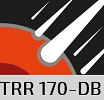About
The Collaborative Research Centre (CRC) 170 "Late Accretion onto Terrestrial Planets" was established in 2016 with funding of 20 million € over nine years by the German Research Foundation (DFG). This legacy website serves as an archived resource for researchers and others interested in planetary sciences. Please note that the site will no longer be updated. However, the associated CRC 170 Research Data Repository TRR170-DB will remain active, preserving and publishing data related to the former CRC 170 projects.
The CRC 170 brought together researchers at Freie University of Berlin (FUB), Technical University Berlin (TUB), University of Münster (Univ. M.), the Natural Museum of History Berlin (MfN), and German Aerospace (DLR) to understand the late growth history of the terrestrial planets, from the last giant collisions with Moon- to Mars sized planetary embryos to the subsequent late bombardment with smaller objects. This period of planet formation is critically important for understanding the formation of terrestrial planets and their chemical differentiation, and for constraining the parameters that controlled their subsequent evolution.
To address these questions and improve our current understanding of the late growth history of the Earth, its Moon, and other terrestrial planets from 4.5 to 3.8 billion years ago, CRC 170 applied a multidisciplinary approach that combined expertise in geochemistry and petrology, remote sensing and planetary geology, and geodynamic and impact modeling:
The combined results helped to refine our fragmentary understanding of several key processes during the early evolution of the terrestrial planets, such as the role of giant impacts in volatile loss processes and core formation, the development and evolution of magma oceans, the transition to solid-state convection, homogenization of chemical and isotopic heterogeneities, and the cooling history of the terrestrial planets.
Besides its scientific goals, CRC 170's dedicated integrated graduate program (IRTG) supported to educate the next generation of planetary scientists, with a particular emphasis on the multidisciplinary character of modern planetary sciences.
